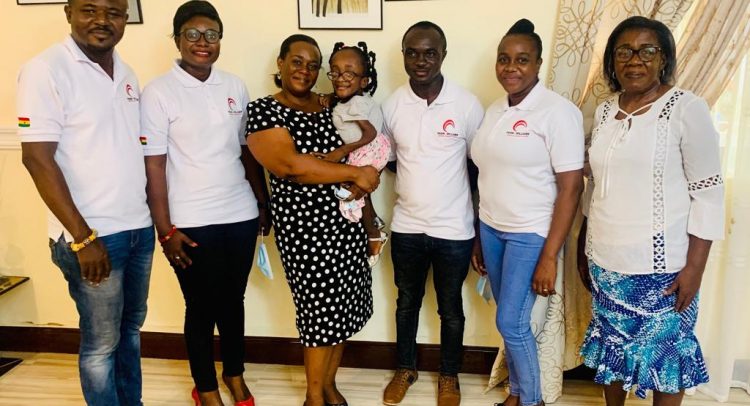The team from PEEW-WILLIAMS Services Ltd. with Ayeyi and her mother.
A Ghanaian-owned engineering and research company, PEEW-WILLIAMS Services Ltd. has donated to the Ghana Osteogenesis Imperfecta Foundation (OIF) in the Central Regional capital, Cape Coast.
A team from the company, which install, service, and maintain Process Instruments, Analyzers, and Control Systems as well as an Accredited Bosch Power Tools Service Centre and Distributor, was led by it’s Executive Director, Edward Kwei Williams, to make the donation of cash and a Christmas hamper.
According to Mr. Williams, the gesture formed part of the company’s Corporate Social Responsibility (CSR) adding that they were touched by the story of the Foundation’s 10-year old Ambassador, Ayeyi Yiadom-Boakye.
Mr. Williams commended Ayeyi’s mother for not giving up on her daughter even when she was advised by doctors and also for creating a Foundation to support other kids living similar conditions in Ghana.
He added that as Christmas signifies a season of giving, they wanted to put a smile on the face of Ayeyi and others living with OI, hence, the show of love and support.
Madam Justina Yiadom-Boakye, a mother of Ayeyi and Founder of OIF Ghana, expressed the Foundation’s gratitude to the company for reaching out to them and wished them well in their business.
She explained that people living with OI have brittle bones and endure multiple fractures and pain from birth.
She encouraged children with similar conditions to put up a strong spirit like Ayeyi who do not let her condition define her despite the pains she goes through.
She mentioned that Ayeyi loves to sing and dance.
Osteogenesis Imperfecta or OI is a condition caused by a defect in the gene that produces type 1 collagen, a protein essential in bone creation. It is estimated that one in 20 000 babies worldwide are affected and cases range from mild to severe.
Individuals living with the condition may experience loss of hearing, heart failure, and spinal cord problems. Symptoms include bow legs and arms, loose joints, multiple broken bones, and respiratory problems.
By Jamila Akweley Okertchiri


